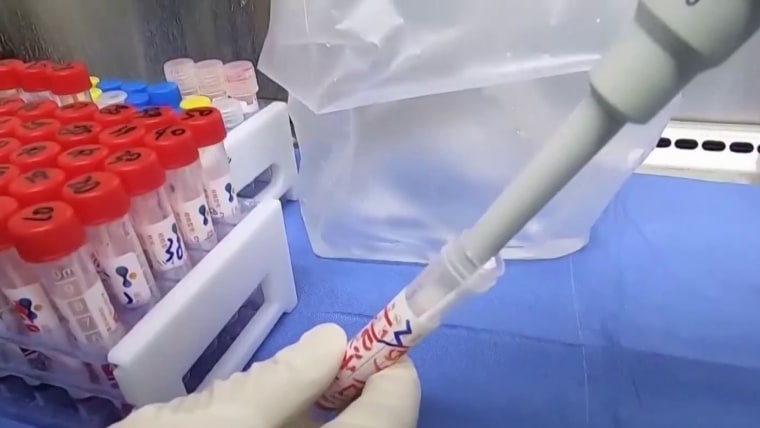WASHINGTON — House Republicans and Democrats on the new select China committee held their first hearing Tuesday night, vowing to investigate the numerous technological, economic and military threats from the Chinese Communist Party.
Members used the primetime hearing as a sort of introduction to the Chinese government for an American audience who may not follow the issue closely, highlighting the broad scope of Chinese influence and avenues the committee may go down as it seeks ways to make the U.S. more competitive.
The packed hearing came amid escalating tensions with Beijing. For days, the nation was captivated by a Chinese spy balloon that floated over Alaska and the contiguous United States before it was shot down off the North Carolina coast.
And this week, the Energy Department concluded in a classified report shared with lawmakers that the Covid-19 pandemic “likely” was spread through a laboratory leak in Wuhan, China. FBI Director Christopher Wray said much the same thing in a Fox News interview that aired moments before the hearing.
“We may call this a ‘strategic competition,’ but this is not a polite tennis match,” China committee Chairman Mike Gallagher, R-Wis., said in his opening remarks at Tuesday’s hearing. “This is an existential struggle over what life will look like in the 21st century — and the most fundamental freedoms are at stake.”
Both the chairman and the panel’s top Democrat, Rep. Raja Krishnamoorthi of Illinois, made clear that the committee is targeting the Chinese communist government — not the people of China who have been victimized by the regime’s oppressive tactics.
“We must practice bipartisanship and avoid anti-Chinese or Asian stereotyping at all costs. We must recognize the CCP wants us to be fractious, partisan and prejudiced. In fact, the CCP hopes for it,” Krishnamoorthi said.
“We have no quarrel with the Chinese people or people of Chinese origin,” he later added.
The high-profile hearing, held in the same cavernous room that housed the historic Jan. 6 committee hearings, began with a video presentation detailing numerous human rights abuses committed by Chinese government officials, from the 1989 Tiananmen Square massacre to the alleged rape and torture of the Uyghurs.
Gallagher and Krishnamoorthi tried to set a bipartisan tone early on the panel, inviting four witnesses who are respected on both sides of the aisle who testified and answered members’ questions during the course of the hearing’s three-hour run.
They included two Trump White House officials — former national security adviser H.R. McMaster and former deputy national security adviser Matthew Pottinger — both of whom publicly criticized Donald Trump after the Jan. 6 attack on the Capitol.
The panel also heard from Tong Yi, a Chinese human rights advocate who served as an assistant to one of China’s most well-known political dissidents; and Scott Paul, president of the Alliance for American Manufacturing, who argued that “the economic policies of the Chinese Communist Party represent a clear and present danger to the American worker, innovation base and our national security.”
The hearing was briefly interrupted by a pair of Code Pink protesters, holding signs stating “China is not our enemy” and “Stop Asian Hate.” Without skipping a beat, Paul pointed out that those demonstrators who have an “unlimited amount of free speech” in America would not enjoy those freedoms in China.
With a subject as complicated as China, Tuesday night’s hearing veered from topic to topic, from TikTok and Taiwan independence to China’s man-made islands in the South China Sea and its purchases of property and farmland in America.
“It’s become more clear to me than ever that China has a plan to replace the United States and they’re working at it every day,” said Rep. Darin LaHood, R-Ill., who serves with Gallagher and Krishnamoorthi on the Intelligence Committee.
“Replace our economy, replace us in technology, replace us when it comes to national security in the military and diplomatically.”
Pottinger warned lawmakers that the social media giant TikTok, owned by the China-based ByteDance, had already admitted to surveilling U.S. journalists to identify and retaliate against their sources. The larger threat from TikTok, he said, is its ability to influence millions of Americans by controlling what they see on the video-based app.
“The bigger coup for the Chinese Communist Party, if TikTok is permitted to continue to operate in the United States … is that it gives the Chinese Communist Party the ability to manipulate our social discourse, the news, to censor and suppress or to amplify what tens of millions of Americans see and read and experience and hear through their social media app,” Pottinger testified.
“TikTok is already one of the most powerful media companies in American history. And it’s still growing,” he added. “It’s not just dancing and kids stuff, it’s becoming a major source of news for a generation of Americans.”
Responding to questions from Rep. Dan Newhouse, R-Wash., McMaster said he was “very concerned” about China’s purchase of lands and buildings near sensitive U.S. military installations and critical infrastructure.
“It’s extraordinary the degree to which the Chinese Communist Party has pursued a massive campaign of espionage,” McMaster testified.
For the first half of the hearing, the issue of the origin of Covid was not mentioned. But that changed when two Republicans — LaHood and Rep. Jim Banks of Indiana — raised it.
“Less than an hour ago, FBI director Christopher Wray confirmed that COVID-19 originated in a Wuhan lab. Do you think there was a chance that the Wuhan lab was involved in bioweapons research?” Banks asked Pottinger.
Pottinger would not go there, but he stated that some Chinese facilities do research into coronaviruses and that the Chinese military had been involved to develop vaccines for coronaviruses.
“There is still a great deal of information that has yet to come out,” Pottinger said.
The China panel’s first hearing was unusually bipartisan and avoided the partisan bickering that had dominated other recent House hearings. As it wrapped up, Gallagher compared the hearing’s length to an Avatar movie.
“And like a cinematic experience, in examining this strategic competition with the CCP tonight, we’ve gotten a sense of heroes and villains. … There’s no question in my mind, that we, America are the good guys,” Gallagher said in closing. “We are the good guys. That even on our worst day, the rest of the world is still looking to us for leadership.”


